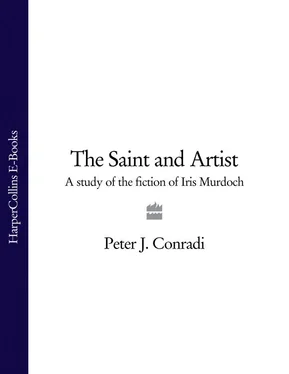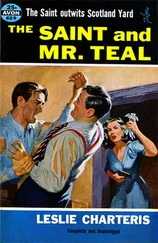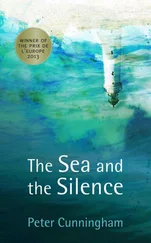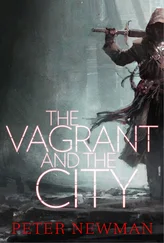If An Unofficial Rose finally is less successful than some of the other books it may be because its very tautness of design, with its closely interwoven destinies, is, for all its admirable economy, somewhat chill. In this it differs from the equally condensed A Severed Head (1961). The rhetorical point of the plot, which is to marry the idea of unfreedom to the idea of mystery, is made better there and elsewhere. The ‘love’ which the characters conspire to enjoy seems, perhaps, too clearly empty.
To put these points differently: the early novels often urge on us a patience with the world’s multiplicity which they cannot yet adequately enact. And this seems partly a result of the author’s unrelaxed investment in mystifying us. To appreciate a mystery you renounce the patient desire to see further and understand better. The early novels sometimes buy off our curiosity with bribes to our love of surprise; and surprise can itself become a ‘manner’, a convention, and can exhibit the human unfreedom it ironises. The later books, which are more relaxed and assured, more often get the balance right.
The individual worlds of these early books are nonetheless always beautifully imagined, fully and in detail ‘there’. There is in them a division of sympathy between two kinds of character: on the one hand the good characters who are in two senses eccentric, both decentred and also dotty or absurd – Hugo, Bledyard, Ann; and on the other hand the worldly charmers who talk a dry Realpolitik of the emotions – Mrs Wingfield, Demoyte, Emma. In some sense Murdoch narrates, as John Bayley said of Tolstoy, by two positives 10 – Ann Peronett’s positive, and Emma Sands’s.
Elizabeth Dipple in her book Iris Murdoch: Work for the Spirit argues that An Accidental Man represents an indictment of the ‘ease of the frenetic, bitchy but comfortable bourgeois world’ to which its characters are too attached. Dipple suggests that ‘Only by jettisoning all the imagery of the culture and facing the ensuing blackness do characters begin to perceive reality, which is their religious duty.’ It is certainly true that Murdoch has written of movement towards ‘an impersonal pictureless void’ as part of a complete religion ( FS 88). Dipple apologises for Murdoch’s rogues’ gallery of ‘hateful characters’ and argues of Austin in An Accidental Man that he is ‘an absolute triumph for Murdoch; the reader experiences a wonderfully pure hatred of him’. Twice addressing herself to Bradley Pearson’s question in The Black Prince – ‘And shall the artist have no cakes and ale?’ (349) – Dipple says, ‘the darkness of man’s squalid limitations must give a resounding “no”’. 11 Though Dipple mentions in passing that Murdoch is not unequivocally hostile to pleasure, and appears to give us a double frame of reference, her own refreshingly enthusiastic account of Murdoch is, I think, intensely censorious about the characters, and gives out a missionary and humourless moral stridency. I shall leave aside the curious assumption that Murdoch is specially hostile to ‘the bourgeois world’. Dipple’s account is remote from how the books feel as you read them; and remote too, from that ‘calm merciful vision…breath of tolerance and generosity and intelligent kindness’ as well as the capacity to ‘leave the reader a space to play in’ (Magee, 1978) that Murdoch admired in great writers of the past.
Against such severities, Lorna Sage, in the most perceptive article on Murdoch’s work that I know, also addresses herself at one moment to An Accidental Man with its court of bourgeois grandees. Sage writes compassionately of the fate of the spinster Charlotte who ‘unselfishly’ looks after her mother only to find herself disinherited when Alison dies. Sage quotes:
She owned her toothbrush but not the mug in which it stood…Everything was entirely as usual, and yet entirely alienated, as if what one had taken to be someone’s house had turned out to be an antique shop. Just for a moment all these things were proclaiming a secret truth…Ownership was an illusion. (94)
Ownership, Sage comments, is ‘an illusion one can hardly live without, however’. Dipple, who argued that morality consisted of ‘jettisoning all the imagery of the culture and facing the ensuing blackness’, fails to notice that Charlotte’s disinheritance leads to her attempted suicide, or that Austin’s destruction of his brother’s priceless china is an act of spiteful and vindictive vandalism. Dipple finds in Murdoch that radical contemptus mundi et vitae that has always characterised a heretical Christian dualism. Sage, on the other hand, finds a series of cautionary tales against any such ‘jettisoning’ of the imagery, and aptly quotes from Bradley Pearson’s description of his deserted sister Priscilla’s abandoned Bristol flat, in The Black Prince:
There was a kind of fairly solid ordinariness about that ‘maisonette’ in Bristol, with its expensive kitchen equipment and its horrible modern cutlery, and the imitation ‘bar’ in the corner of the drawing-room. Even the stupider vanities of the modern world can have a kind of innocence, a sort of anchoring quality.
Priscilla dies when her marriage breaks up and she is deprived of even a few of these ‘anchoring’, ‘steadying’ possessions. Sage comments that
In Iris Murdoch’s world it is spiritual arrogance of the most dangerous kind to imagine you can become cultureless; she is not much troubled by the snobbish imperative of placing the quality of one kind of life over another, but she refuses to imagine a life that is ‘free’ of cultural patterns. 12
The author that Dipple intuits behind the books is in some respects a vindictive moralist. Sage, on the other hand, finds her cheerful, complaisant and worldly. Each of these critics seems to have understood one half of Murdoch’s genius, which is (roughly) to be an idealist without illusions. Dipple sees only the moral passion and idealism, Sage chiefly the absence of illusion and the moral scepticism. It is the combination of the two that gives Murdoch her brilliant and essentially tolerant double focus. Becoming good may very well involve a slow ‘jettisoning of imagery’ and a breaking of patterns. When others perform these acts of iconoclasm for us, or when we perform them ourselves too fast, the breakage can be malign. It depends on who you are; and how situated.
An Accidental Man (1971) is a marvellous book in its relaxed mediation between these stances. It resembles Henry James’s The Awkward Age in the dryness of its irony about its strange and ‘awful’ crew. The only character in the book incapable of spite is the dog Pyrrhus, often-abandoned and renamed by new owners. The little scene in which Pyrrhus watches the lovers Charlotte and Mitzi row, and ponders anger as a disease of the human race, is a small triumph, moving, funny and true. Dryness of course need not exclude compassion. The dreadful Austin, the accidental man of the title, is, as one of the choric party voices puts it at the end, ‘like all of us, only more so’. Yet in case this makes us feel too comfortable, a second voice adds, with a double-edged complacency that cheerfully mocks our own, ‘Everybody is justified somehow.’ The narrator can be urbane, like her characters. Austin and his brother Matthew are dimly echoed by Charlotte and her sister Clara. Both sets of siblings are deeply dependent on life-myths which feed and require obsessive reciprocal feelings of guilt, hostility, pity and jealous rivalry, including sexual rivalry. Austin, associated like so many men in Murdoch’s novels of the 1970s with Peter Pan, the ‘sinister boy’, on account of his immature spirituality, is a person who positively invites his own bad luck. Failure has become so much his secret consolation that he resembles a vampire. Austin is a clown, a comic awful figure, and a fool. He is surrounded by a succession of demonic ‘accidental’ figures – Norman Monkley the incompetent blackmailer, the horrible child Henrietta Sayce who finally falls off some scaffolding and breaks her skull. There is a pervasive Schadenfreude in the book, a malicious delight as typical of Murdoch’s world as it was of Dostoevsky’s. In Crime and Punishment Dostoevsky defined this special joy in the misfortunes of others or in their deaths when he wrote after Marmeladov’s accident of ‘that strange inner feeling of satisfaction that may always be observed in the course of a sudden accident even in those who are closest to the victim and from which no loving man is exempt, however sincere his sympathy and compassion’.
Читать дальше












